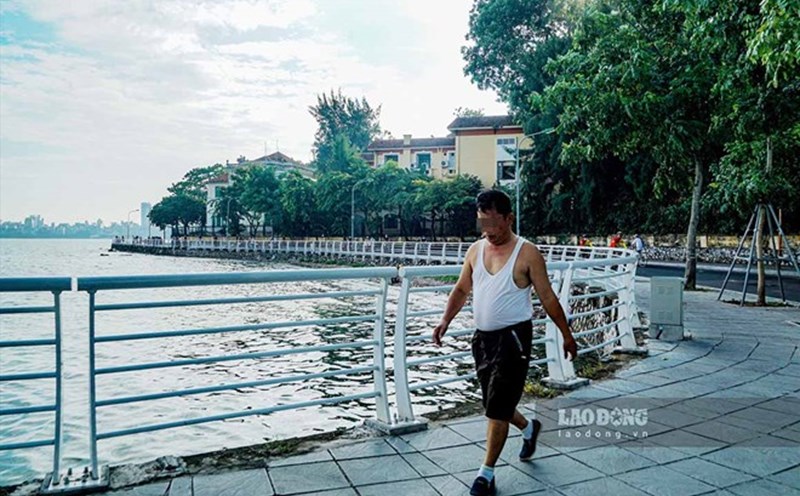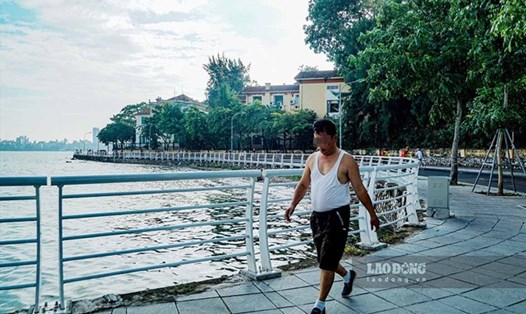108 Military Central Hospital received emergency treatment and treated 6 patients with heat stroke after participating in a marathon in Hanoi.
On the morning of October 13, the Emergency Department of the 108 Military Central Hospital admitted 6 patients in a state of heat shock with impaired consciousness: lethargy, weakness of limbs, low blood pressure, dry skin, oliguria; tests showed increased muscle enzymes, impaired kidney function. Through quick investigation, it was learned that the 6 patients were participating in a marathon.
Immediately after receiving the patients, the doctors performed initial first aid: cooling the body, administering fluids, monitoring vital signs, and organ function. After that, the 6 patients were transferred to the Department of Internal Medicine and Poison Control and the Department of Nephrology and Hemodialysis for further treatment. Currently, the condition of all 6 patients is temporarily stable, hemodynamics are within limits, and kidney function is gradually recovering.
According to Dr. Nguyen Thai Cuong, Head of the Emergency Department, 108 Military Central Hospital, in recent years, the number of heat stroke cases when participating in marathons and long-distance sports has increased. Heat stroke due to exertion often occurs in young, healthy people, occurring after exposure to high environmental temperatures and at the same time due to heat generation during exercise or exertion, especially in non-professional athletes when participating in marathons.
"Heat stroke damages multiple organs including the central nervous system, respiratory system, circulatory system, liver, kidney and hematology system, causing rapid multiple organ failure if not treated promptly, even death. Therefore, understanding knowledge about heat stroke, early recognition signs, timely emergency care as well as heat stroke prevention is extremely important, helping us reduce the rate of illness and death" - Dr. Pham Dang Hai, Head of the Department of Internal Medicine Resuscitation and Anti-Poisoning, 108 Military Central Hospital advised.
Some signs that help people recognize heat stroke early include impaired consciousness: Coma, seizures; respiratory disorders: Difficulty breathing, respiratory failure; cardiovascular disorders: Arrhythmia, hypotension, oliguria, accompanied by fatigue, headache, flushing, possible vomiting, diarrhea, body temperature above 40 degrees Celsius, hot and dry skin.
Dr. Pham Dang Hai gives some advice:
Always be mindful of your environment when exercising: Try to choose a cooler time of day to exercise when the weather is hot. Also, avoid exercising for long periods of time and take plenty of breaks in between (at least every 30 minutes of exercise).
Heat acclimation: It takes about a week to acclimatize to hot weather. Moreover, the higher the intensity of your workout, the more heat your body generates, increasing the risk of heat stroke. You should avoid strenuous exercise when your body is not used to the temperature and acclimatize slowly by starting with light exercises for short periods of time. You can also apply this method when you have not exercised for a while.
Wear the lightest clothing possible and avoid direct sunlight: When it is hot, you should choose clothing made from absorbent and well-ventilated materials. When exercising in direct sunlight, you should wear a hat to protect your head from the heat.
Stop if you feel unwell: If you feel even the slightest bit unwell, stop exercising. Be especially careful when running or doing repetitive sprints. These are typical cases of heatstroke that are often recorded. Listening to your body and reacting promptly is an extremely important solution to avoid heatstroke.
Make sure your body is always hydrated: When your body sweats a lot, in addition to water, make sure your body is supplemented with salt (sodium) in addition to filtered water.









